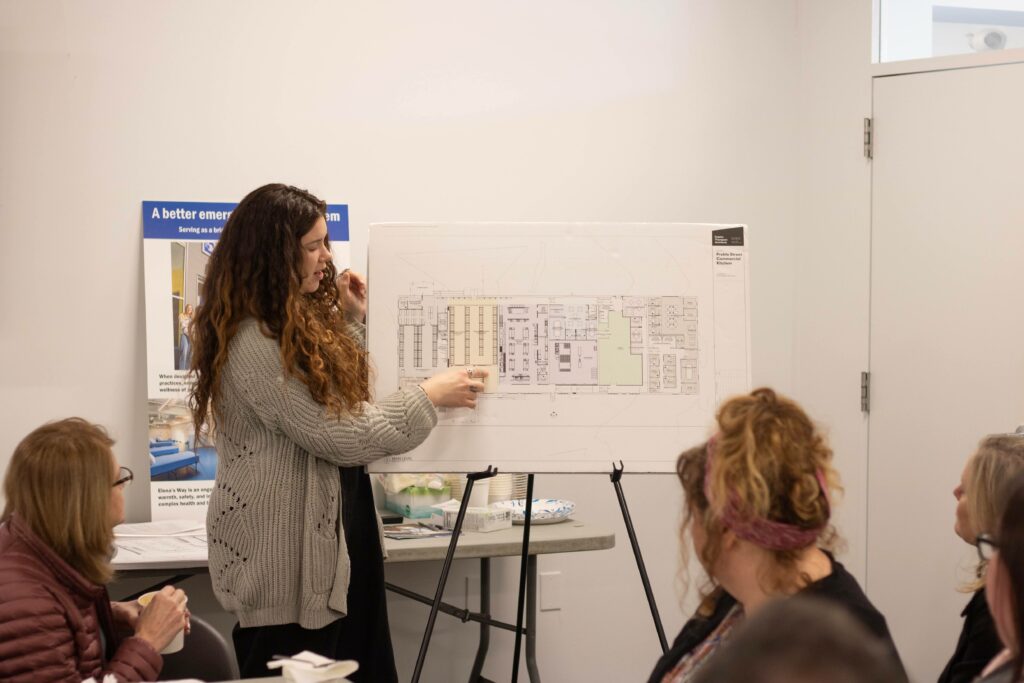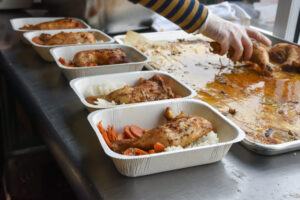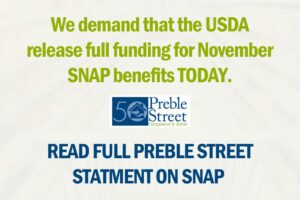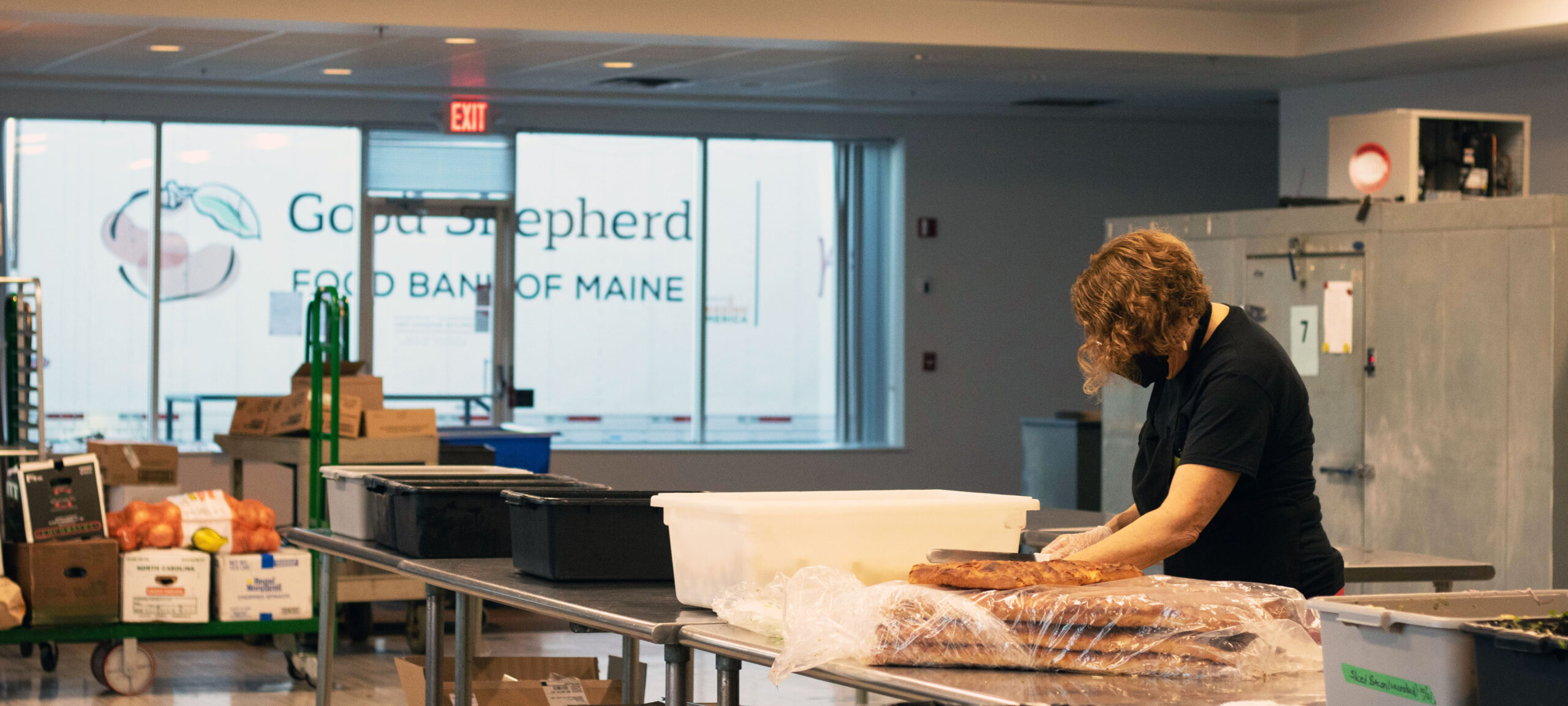For a person experiencing homelessness, poverty, or housing insecurity, meeting the basic need of nourishment is often the first step needed to move toward stability. When basic needs are met, employment, housing, and connection to health services and other social services often become the next step. “At a time of rising food costs, it is more important than ever that people have access to healthy and nutritious food options, regardless of their socioeconomic status,” says Carolyn Silvius, Advocate, Homeless Voices for Justice. “The current cost of food is forcing Mainers to make difficult decisions as they are forced to cut costs to feed themselves and their families.”
For nearly 50 years, Preble Street has focused our anti-hunger work on providing hot meals and pantry boxes and on anti-hunger advocacy efforts. The vision for the Preble Street Food Security Hub was born out of this experience, as well as the dramatic need for food and meals that Maine experienced during the pandemic. “We want to empower our community members and move towards greater food security, with a focus on nutrition and supporting Maine’s farmers and producers,” says Natalie Varrallo, Director, Preble Street Food Programs. “So, that’s really what is driving us. How can we better serve clients? How can we make Maine a leader in the food security world? We believe that the Food Security Hub can be the place that makes it possible for Maine to end hunger for all.”
Once fully renovated (renovations of the space will begin later this year), the Food Security Hub will combine a 5,000-square foot commercial kitchen, ample space for education and collaborative partnerships, and an innovative new food processing lab. The food processing lab will include a range of equipment to support the freezing, dehydration, and preserving of Maine-raised and grown produce and is a key part of our efforts to localize the food system. Already, the food used for prepared meals at the Food Security Hub relies heavily on local Maine ingredients and supports Maine farmers.
Based on current estimates, once the vision for the Food Security Hub is fully realized, 75% of the products preserved at the Food Security Hub will be Maine-grown. The processing lab will preserve approximately 180,000 pounds of product within the first 18 months and will steadily increase to support Maine’s needs.

Good Shepherd Food Bank is one of the more than 40 Maine programs, facilities, farms, and nonprofits currently partnering with Preble Street on food security in Maine. It is through this partnership that frozen prepared meals created at the Food Security Hub in South Portland will be transported across the entire state. “This innovative collaboration between Preble Street and Good Shepherd Food Bank leans into both of our organizations’ areas of expertise to provide thoughtfully prepared meals with local ingredients to all Mainers experiencing hunger,” shares Amanda Marino, Advocacy & Leadership Program Manager, Good Shepherd. Whether these frozen prepared meals go to food banks, senior meal sites, or an area facing an emergency, the Food Security Hub will be ready to respond with individually prepared nutritious meals for that community.
Good Shepherd Food Bank’s transportation system will also help expand our partnerships with farms around the state, picking up and delivering produce to the Food Security Hub for processing and meal production.
“Two and a half years ago when I started at Preble Street, we were making 600 meals a day. We’re now doing around 2,000 meals a day and once we have the capacity here at the Food Security Hub, we’ll be able to do up to 10,000 meals a day,” says Varrallo. “With rising food prices and the decrease in SNAP benefits, there is just so much need right now for more meals and more food boxes.”
“But, I’m hopeful,” says Varrallo. “If we can fully realize all that we envision for the Food Security Hub, we take a giant step forward to solving food insecurity in Maine and do it in a way that is local, sustainable and nutritious.”

Natalie Varrallo shows off the plans for the future of the Food Security Hub.
Read more...

The Preble Street response to the SNAP crisis
Donate here to help Preble Street provide emergency food to people in need in Maine! Volunteer with Preble Street to help produce up to 10,000 meals a day. Update: December 3, 2025 While last month’s SNAP benefit emergency was resolved, the ongoing SNAP crisis is not. The massive cuts to SNAP and Medicaid made in this

Staff highlight: Jacob Speakman – Creativity and confidence in the kitchen
Preble Street staff are #CompassionInAction, and we want you to get to know them! This month we’re introducing you to Jacob Speakman, Sous Chef at Preble Street Hope House Name, title, and program: Jacob Speakman, Sous Chef, Preble Street Hope House How long have you worked in your program? I started working in the Hope House Kitchen in

Preble Street Statement on SNAP
Update: November 10, 2025 We’re thankful to announce that full SNAP benefits have been issued for 97% of Maine recipients! A small percentage of households, mostly those who applied for SNAP benefits after November 2, have received reduced benefit amounts for this month. Many thanks to all who advocated for this, including Maine’s Governor, Attorney
